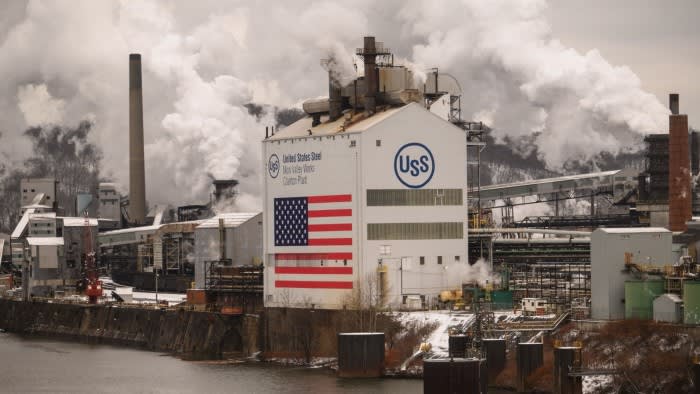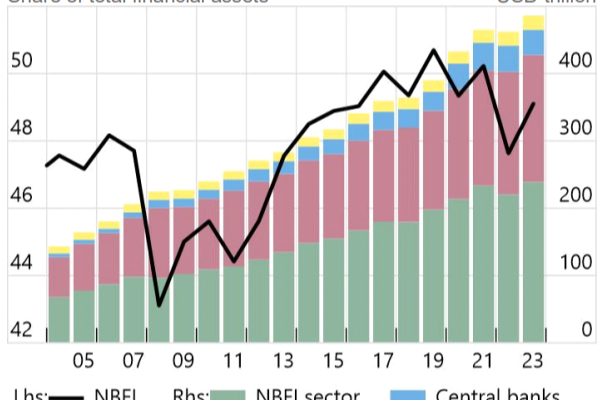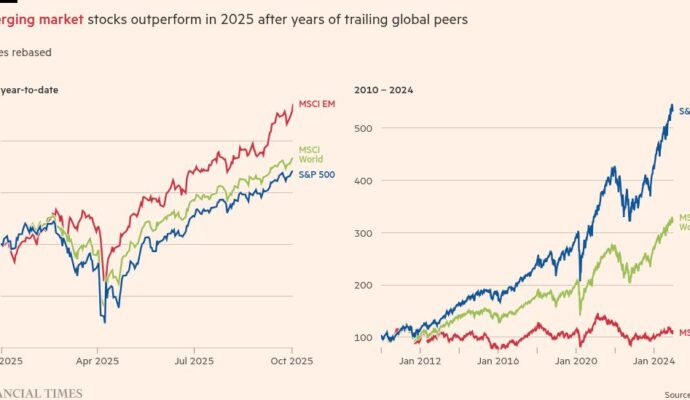
Unlock the Editor’s Digest for free
Roula Khalaf, Editor of the FT, selects her favourite stories in this weekly newsletter.
This article is an on-site version of our Swamp Notes newsletter. Premium subscribers can sign up here to get the newsletter delivered every Monday and Friday. You can explore all our newsletters here
Last week, I did an FT Big Read on the geopolitics of the shipping industry, which has become the new front for US-China trade tensions following a petition brought by the United Steelworkers and other industry unions against unfair Chinese practices in shipbuilding.
Without repeating myself, I’ll just summarise the big takeaway, which is that this isn’t just another old-line battle about steel. It will impact the 2024 election cycle, as well as global economic and security relations (in particular by drawing attention to the way China has figured out how to digitally monitor global supply chains). It will also set some new precedents for how business operates in the post-neoliberal era in the US, as unions become far more strategic about their labour actions and demands.
My colleague Demetri Sevastopulo, our US-China correspondent, has been breaking news over the past few days not only about the petition, known as a section 301 case, but Joe Biden’s subsequent opposition to the Nippon Steel acquisition of US Steel. It’s hard to imagine that the president could have taken any different stance in the current environment. Trump had already said that he wouldn’t back the deal if he were in charge, putting Biden’s back to the wall and forcing him to really declare his support for one of his key constituents — union members, and steelworkers in particular.
The Biden administration now has 45 days to decide whether they want to take on the 301 case, which calls for fines and possible tariffs on China, as well as a variety of actions to support the re-industrialisation of the shipbuilding industry in the US. But I expect that the White House will take the case on sooner than that. Indeed, if they appear to dither, it will hurt Biden in Pennsylvania, home of the United Steelworkers and a key swing state. For more on the way in which unions are playing the politics of swing states, check out the most recent Swamp Notes podcast, in which the FT’s US labour and equality correspondent Taylor Nicole Rogers and I discuss this and other topics.
The steelworkers action is one of a number of more strategic and nuanced labour battles being fought in the US. While unions used to negotiate mainly for better pay and benefits, they are increasingly challenging not only the status quo of the global trading system, but also corporate financialisation (the United Autoworkers Strike, which targeted issues like stock buybacks, was very much about that), and how the intellectual property pie will be shared (witness how the Communication Workers of America’s Hollywood strikes challenged how AI can be used.)
You’re also seeing more cross sectoral action, and a sense that the labour movement (which has been quite fragmented) is coming out of its silos, and into a larger understanding of itself as a political force. I certainly got that impression during my recent interview of four major union leaders in the US. This isn’t completely new — see Emily Peck of Axios on the history of the United Steelworkers influence on M&A in the US. What is new, at least within the past 40 years or so, is labour’s increasing diversity, the way in which union leaders are working together across manufacturing and service sectors, and the movement’s ability to leverage not just member power via collective bargaining, but financial and political power in increasingly impactful ways.
If I were a CEO, I’d think about how to get on the right side of this. The pro-union Microsoft stance, for example, is a sharp contrast to how Apple or Amazon have behaved. Peter, what’s your takeaway on this latest labour action, and it’s broadest economic and political impact?
Recommended reading
I recently watched my former Newsweek colleague Jonathan Alter’s wonderful documentary about two of the best columnists of all time — Pete Hamill and Jimmy Breslin. These guys are my heroes. To have those voices — the grit filled sucker punch of Breslin’s and the urban poetry of Hamill’s — and to impart so much wisdom at the same time, is really something.
I love that Betsey Stevenson found a way to link Ryan Gosling’s hilarious “I’m Just Ken” rendition at the Oscars to male performance in the service economy. If only the Kens would move out of factory work and into nursing!
The always brilliant John Authers on why the stock market doesn’t care about rate cuts. The thing that popped for me was that tech giants’ profits are so high they have become a new kind of Fed put. The question in my mind, though, is what happens to the profits eventually in an era of geopolitical de-risking and ultimately, more tech regulation.
In the FT, my colleague Gillian Tett is spot on about how TikTok highlights all the risk and paradoxes in the marketplace today. And just for fun, a dose of Kate-Gate from colleague Camilla Cavendish.
Peter Spiegel responds
Rana, you’ve lumped the petition against Chinese shipbuilders with Biden’s announcement last week that he opposes Nippon Steel’s acquisition of US Steel. From a political perspective, you’re right to link them: they’re both about Biden’s fight to retain the blue-collar labour vote in states like Pennsylvania, which will be critical to his re-election hopes.
But let me separate the two cases, because politics and steel are really the only things they have in common. The China shipbuilding investigation appears, on its face, to be a legitimate sounding of the alarm about Beijing’s mounting maritime power and its oft-documented unfair trade practices.
The Nippon Steel acquisition, on the other hand, smells of rank nationalism and protectionism, and it gives one of our most important allies a black eye right at a time it has been stepping up in its role as a reliable partner against China in east Asia.
Let’s be honest: US Steel still has the famous name that we all associate with Andrew Carnegie and America’s rise as the world’s dominant industrial power in the late 1800s. But US Steel hasn’t been that US Steel for more than half a century. It’s not a national champion that needs protecting for military or economic security reasons, and it hasn’t been a significant part of the American industrial base since the second world war.
But even if US Steel were essential to national and economic security, since when has it become a threat to sell a nationally significant American company to a rival from arguably the US’s most important non-Nato ally? Is there any serious evidence that a Japanese company threatens US security, which is the whole point of the Cfius review process?
And if the real reason for opposing the Nippon Steel takeover is that it threatens American jobs, as Biden claims, what evidence do we have that Nippon Steel is in any way anti-job or anti-union? They certainly don’t have that record in Japan, and they’ve indicated they will honour the United Steelworkers’ existing contracts.
Having a strong, aggressive trade policy to defend American industry against unfair trade practices by economic rivals like China is one thing. But to use trade policy as a shield to advance economic nationalism and xenophobia is not good policy or good geopolitics.
Your feedback
And now a word from our Swampians . . .
In response to “Washington DC’s red herring on TikTok’s ‘digital fentanyl’”:
“Mainstream America is paranoic about China. The prospect of a country with a GDP larger than the US and technologically at the frontier is unacceptable and has to be stopped — whatever the price. The sensible opinion of the late Henry Kissinger, or the 100 of “the best and the brightest” that signed the open letter ‘China is not an enemy’ remains, unfortunately, a minority view.” — Eugenio Bregolat, former Spanish ambassador in China and Russia
“I’ve never seen a president preemptively suggest opposition to an acquisition undergoing inter-agency national security review, much less an acquisition by a company from a treaty partner that we are obliged to defend with US troops. On the eve of Prime Minister Kishida’s visit, when the leaders will be discussing real national security threats, we should be strengthening our partnership not threatening protectionist action to score political points.” — Daniel Price, managing director, Rock Creek Global Advisors
Your feedback
We’d love to hear from you. You can email the team on swampnotes@ft.com, contact Peter on peter.spiegel@ft.com and Rana on rana.foroohar@ft.com, and follow them on X at @RanaForoohar and @SpiegelPeter. We may feature an excerpt of your response in the next newsletter
Recommended newsletters for you
Unhedged — Robert Armstrong dissects the most important market trends and discusses how Wall Street’s best minds respond to them. Sign up here
The Lex Newsletter — Lex is the FT’s incisive daily column on investment. Local and global trends from expert writers in four great financial centres. Sign up here


